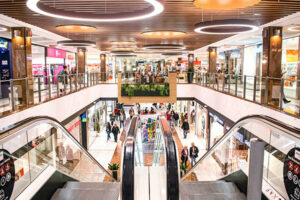London Designer Outlet is unique due to its combined formula of retail and leisure in a city location – next to the world-famous Wembley Stadium. It has proved that outlets can be about much more than an out-of-town retail alternative. London Designer Outlet has brought out-of-town and in-town fundamentals together by incorporating designer discounts, food and beverage, leisure destinations, and high street essentials. The scheme has succeeded in attracting tourists from all over the world, yet still provides the immediate catchment with a central, community-oriented hub. James Cons, Managing Director at Leslie Jones Architecture, has overseen the design and creation of London Designer Outlet, as well as the overarching retail master plan for the entire Wembley Park regeneration site. The result has revived the outlet concept and brought it into the 21st Century.
Europe’s first designer outlet sprang up in the mid-‘90s to bridge the gap between luxury and discount. Initially met with skepticism, the concept became a rising star for shoppers willing to get out of town to find luxury goods at bargain prices. Its popularity has gained unprecedented momentum in the UK throughout the recession, as consumers looked for a good deal and especially among international tourists looking for British brands at a fraction of the cost. Investors and retailers on the continent, however, have yet to benefit from this new breed of outlet.
As we exit recession, outlets are actually growing in relevance as shoppers have become more sophisticated. With more offline and online options at their fingertips, outlets can bring a new offer to consumers. London Designer Outlet proves that outlets are able to adapt to a consumer market that is no longer driven by simple bargain-hunting, but by an innovative lifestyle experience unavailable online.

CREATING THE DESTINATION
Outlets are often positioned as weekend destinations that will typically encourage lengthened dwell time as consumers travel to the outlet for a retail experience rather than a quick excursion down the high street. Why can’t the successes of both be brought together to provide retailers and consumers with one enhanced offering of high-end retailers, food and beverage, and leisure activities?
Leslie Jones Architecture was appointed by Quintain to fulfill their requirement for a new designer outlet in northwest London that would become a crucial element of a wider urban ecosystem. The end result had to be able to attract tourists with traditional outlet principles, be modernized to reflect the site’s global reputation, and, at the same time, become the heart of a large-scale mixed-use development. This all had to be achieved using value-focused design solutions. London Designer Outlet sits within the 87-acre Wembley Park regeneration site in the shadow of Wembley Stadium – a world-renowned events arena. It serves a thriving community, but to achieve this, scrupulous planning was needed to ensure a clear modus operandi could be created and maintained: a focused retail, entertainment, and leisure offer.
A critical element to delivering this vision was to create a retail and leisure dynamic that would ensure a fully rounded lifestyle destination, appealing to a sophisticated consumer market that has everything London can offer on its doorstep. Outlet stores in London Designer Oulet sit alongside Wembley Park’s new restaurants and bars, including some of Europe’s most popular food chains, as well as a Cineworld cinema complex that seats approximately 1,800 people. In total, the scheme incorporates 70 shops and 20 restaurants and coffee shops to achieve this dynamic.
As Quintain has been working to enhance Wembley Park’s public realm, making way for new homes as well as refurbishing Wembley Arena, the designers for London Designer Outlet had to capitalize on these improvements to the area and embed it into the surrounding urban fabric. To achieve this, Quitain developed place-making solutions for the outlet, including play parks for children and public spaces to host retailer and community events.
The entrances are open to neighboring areas to enhance connectivity. Spacious walkways ensure unrestricted movement throughout the scheme Seating and plants in the public realm establish a link between the regeneration site’s areas and the offering provided by London Designer Outlet. The destination is further supported by an adjacent parking area.

ALL IN THE DESIGN
The architecture of London Designer Outlet had to sit within the surrounding modern cityscape while reinforcing the visitor experience. Leslie Jones Architecture takes a commercial, yet creative, approach to design to ensure a real return on investment for the developer. They therefore chose economical, yet dynamic, materials for London Designer Outlet. The design for the two-level outlet – with its clear frontages, open walkways, and balconied restaurant terrace – utilizes London Designer Outlet’s internationally recognized location by maximizing views over adjacent landmarks, such as the arch of the new National Stadium.
The building incorporates a warm brickwork plinth defining the open street retail circuit with a lightweight rainscreen cladding to the cinema – enhanced by vertical, quilted stainless steel panels carrying color-changing LED lighting vitalize the scheme. A five-story glazed “prow”, with a pixelated dichroic pattern, overlooks the primary entrance to the two-story retail gallery and encloses the vertical circulation, which takes visitors up to the cinema and its mezzanine bar. The open-street shopping environment is partially protected from the elements by ETFE/glazed canopies and overhanging balconies from the restaurant terrace. The architecture has created a consistent identity that can be felt throughout the entire scheme.
This new breed of designer outlets could be easily applied to urban locations throughout Europe. By mastering the connection between branding impact and consumer, as well as tenant behavior, outlets across Europe could attract new retailers as well as local and international shoppers to diverse locations – ensuring commercial success for the scheme. Working with Quintain, Leslie Jones’s designs have helped to create a modern take on a popular retail offering, a contemporary version of a classic concept that responds to tourists visiting the stadium for world-class events or those coming to a European capital in search of global brands. Additionally, it has delivered a lifestyle destination for one of the UK’s largest regeneration projects.

ATTRACTING THE RETAILERS
An identity developed as such, through conscientious master planning and innovative architecture, is what retailers can trust when deciding if a scheme can host their brands. Marks & Spencer and Clarks are examples of British retailers who have taken space at London Designer Outlet. Marks & Spencer opened its largest outlet unit in the scheme, capitalizing on the regeneration of Wembley and the four million in annual footfall that comes through the area for the events taking place in the stadium.
International brands such as Guess, Bjorn Borg and Gap have also been attracted to the center. London Designer Outlet has also capitalized on its proximity to Wembley Stadium to attract the world’s leading sport brands, with Nike, Asics, Helly Hansen, and Adidas having signed up to be a part of the scheme. This adds to the identity of London Designer Outlet, directly targeting a specific consumer group that is relevant to the area. The architecture creates a new identity, which will allow for greater levels of engagement between retailer and consumer to move the outlet shopping industry into a new era.
London Designer Outlet’s offer is unique, but with due diligence, the successes achieved here are most certainly applicable in re-generation sites across Europe, which have the potential to incorporate a balanced retail and leisure collaboration. A true understanding of how to strike that balance correctly in order to produce a focused end result and attract target markets will be critical to future projects’ success. When coupled with leisure to create a lifestyle destination, outlets can proudly deliver what consumers now desire and tenants need most – a compelling experience to engage the senses that websites alone cannot match.







